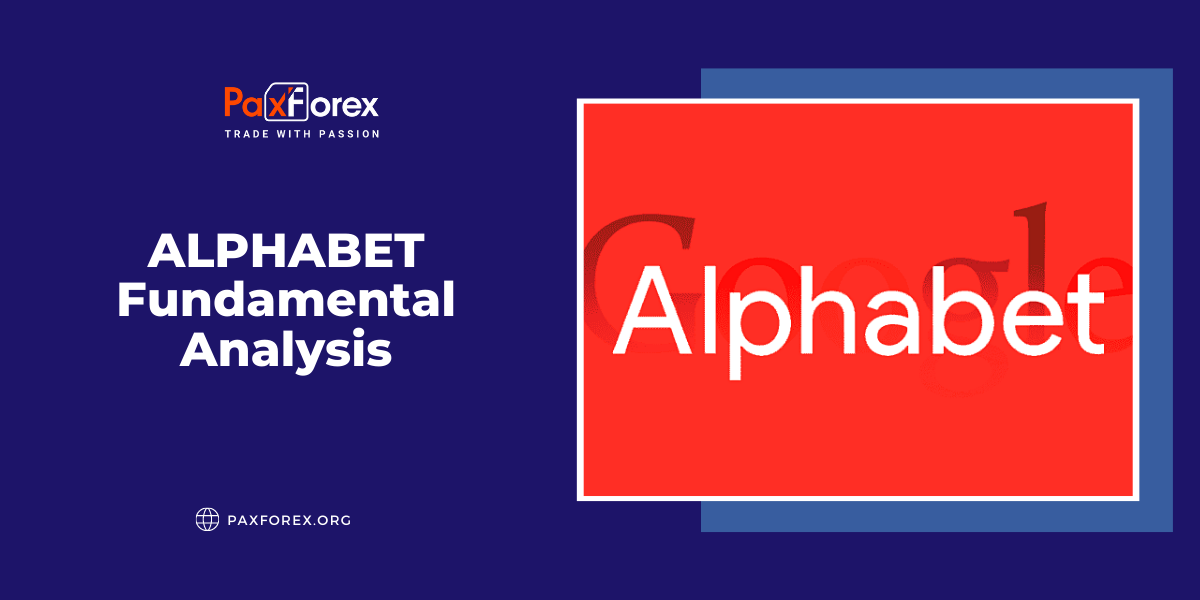
Source: PaxForex Premium Analytics Portal, Fundamental Insight
There is no denying that Alphabet has become a force to be considered with. Indeed, not many companies can boast that their branded product or service has become a verb: "google it." Beyond search, Alphabet is a leader in digital advertising, smartphone operating systems led by Android, and cloud computing with the rapidly growing Google Cloud.
Recently, the tech giant informed about a historic 20-for-1 stock split, reducing the size of its stake for the first time in eight years. Now investors who have been considering buying the stock are encountered with a bothersome question: should they buy the stock now or wait until after the split?
It's been a long time since Alphabet held its last stock split. In fact, the last time it happened was when the company was still called Google. That was in 2014, and Google didn't change its name to Alphabet until late 2015.
What's notable about the previous stock split is that it created non-voting Class C shares of Google, while Class A shares maintained the standard one vote per share. In April 2012, a shareholder lawsuit was filed alleging that co-founders Larry Page and Sergey Brin orchestrated the stock split to maintain control of the company to the detriment of shareholders. As a result of the split, the company increased the number of shares without a commensurate increase in voting rights. The lawsuit was eventually settled, allowing the split to proceed with shareholder compensation.
In the nearly two years between the announcement and the actual stock split, Google stock was up about 74%.
Typically, a split does not change the overall economic value of the company that is doing the split. One share of Alphabet worth $2,800 is worth as much as 20 shares worth $140 (20 x $140 = $2,800). As with pizza, the number of slices does not change the overall size of the pie. Nevertheless, some argue that the underlying effect is positive for investor psychology.
That's exactly what happened when several well-known companies made headlines over the past couple of years as investors rushed to buy shares after the stock split announcement. Apple stock rose 34% in a month after announcing a 4-for-1 stock split in July 2020. Tesla followed suit less than two weeks later, announcing a 5-for-1 stock split. Between the announcement and the completion of the split, the stock jumped 81%.
A similar situation occurred in May 2021, when The Trade Desk announced a 10-for-1 stock split and Nvidia unveiled plans for a 4-for-1 stock split. The Trade Desk and Nvidia stock rose 27% and 24%, respectively, between the day of the announcement and the day the split was completed.
Aptus Capital Advisor senior analyst and portfolio manager David Wagner opined on the situation, "We all know the split doesn't boost the fundamental value of the company. ... but from what we've seen in the market with Tesla and Nvidia, people like to chase splits."
There are many reasons to think that Alphabet will continue on the same upward trajectory that led to that famous stock split.
Google's dominance in search remains unchallenged, with about 92 percent of the global search engine market. Alphabet is using this advantage to gain a leadership position in digital advertising, which accounts for about 29% of global digital ad spending. Nor should we forget Google Cloud, which has quietly risen to the top three, behind only Amazon Web Services and Microsoft Azure.
These factors drove Alphabet's strong performance. In the fourth quarter, revenues of $75.3 billion rose 32% year over year, and operating margins improved, boosting earnings per share (EPS) to $30.69, a 38% increase.
For investors who are optimistic about Alphabet, there's no reason to hesitate to buy the stock, unless, of course, your financial situation allows you to shell out almost $3,000 per share. If that's the case, and your broker doesn't offer the option to buy fractional shares, a stock split will make them much more affordable over time.
If you plan to buy Alphabet stock now, keep in mind that it may require additional record keeping. Those who are buying the stock now (at about $2,800) need to remember to adjust their records to reflect the revised cost base by dividing it by 20 to account for newly issued shares ($2,800 / 20 shares = $140). This will become important when you eventually sell your stock and settle with the tax authorities. Fortunately, brokerage firms know how to do this, so it shouldn't be too difficult.
Given Alphabet's market dominance, great execution, and continued outlook, it doesn't matter if you buy the stock now or wait until after the July 18 split-adjusted trading. What matters is that you buy them.
As long as the price is below 2650.00, follow the recommendations below:
- Time frame: D1
- Recommendation: long position
- Entry point: 2682.00
- Take Profit 1: 3087.00
- Take Profit 2: 3188.00
Alternative scenario:
If the level of 2650.00 is broken-out, follow the recommendations below:
- Time frame: D1
- Recommendation: short position
- Entry point: 2650.00
- Take Profit 1: 2486.00
- Take Profit 2: 2389.00













